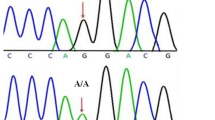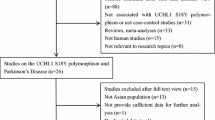Summary.
Apart from very few families who have a direct cause from genetic mutation, causes of most Parkinson's disease (PD) remain unclear. Many allelic association studies on polymorphism of different candidate genes have been studied. Although these association studies do not imply a causal relationship, it does warrant further studies to elucidate the pathophysiologic significance. CYP1A1 polymorphisms have been reported to be associated with PD in a Japanese population sample. Since CYP1A1 transforms aromatic hydrocarbons into products that may be neurotoxic and perhaps lead to PD, we therefore undertook a study to look at the possible association of CYP1A1 polymorphism and PD in a Chinese population. Contrary to the Japanese result, we did not find any statistically significant difference between the PD group and the control group in our study with a bigger sample size.
Similar content being viewed by others
Author information
Authors and Affiliations
Additional information
Received April 30, 2001; accepted September 4, 2001
Rights and permissions
About this article
Cite this article
Chan, D., Mellick, G., Buchanan, D. et al. Lack of association between CYP1A1 polymorphism and Parkinson's disease in a Chinese population. J Neural Transm 109, 35–39 (2002). https://doi.org/10.1007/s702-002-8234-8
Issue Date:
DOI: https://doi.org/10.1007/s702-002-8234-8




